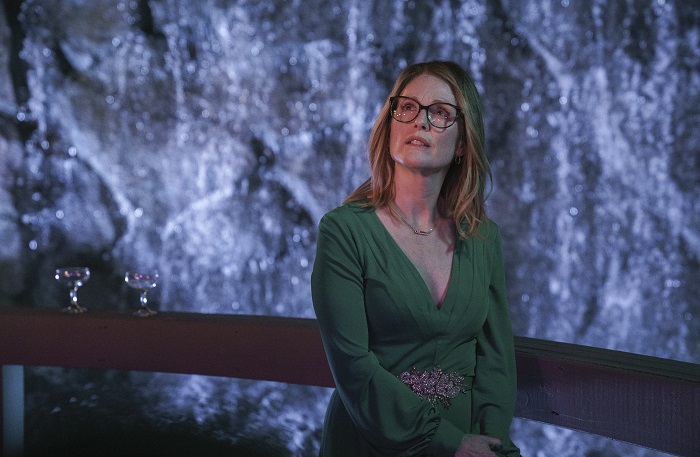

Review: Julianne Moore is Excellent in the Resonant ‘Gloria Bell,’ Exploring Womanhood as an Everyday Transformative Process
By Roxana Hadadi | Film | March 30, 2019 |
By Roxana Hadadi | Film | March 30, 2019 |

I will be honest with you and say that I did not expect to like Gloria Bell. The trailer is very “white lady problems,” and I was doubtful of whether filmmaker Sebastián Lelio (of Disobedience and A Fantastic Woman) really needed to remake his own 2013 film, Gloria. That movie already exists, and it’s also about a 50-something woman trying to navigate dating and parenting as “senior citizenship” approaches, and I wasn’t sure what Gloria Bell could actually do differently.
And yet, there I was, at the end of Gloria Bell, blinking back tears, thinking about calling my mother (it was late, she would have been asleep, I’ll do it today!), and considering all the nuances of the film and its consideration of womanhood and femininity as everyday transformative processes, as rituals that require work, that take and take and take from us until finally there is nothing left for us to give to anyone but ourselves. Friends, it kind of gutted me!
Gloria Bell focuses on, as Beanie Feldstein screams in Saoirse Ronan’s face during Lady Bird, the titular character, a 50-something woman living on her own in Newport Beach, Calif. Her kids live nearby, and she sees them fairly often, but she’s clearly the initiator—she leaves them both voicemails that end with “I love you. It’s your mother.” She sings to herself often, in the car or while washing her bras in her tiny apartment’s bathroom sink. There’s a neighborhood cat that keeps breaking into her house and making itself comfortable, and there’s an upstairs neighbor who seems to be perpetually in the middle of a nervous breakdown, screaming and yelling and cursing and throwing things. She has a steady job as an insurance agent and a close friend at work, but they’re worried about their retirement plans, about whether their 401ks will be enough to cover their expenses, if they’ll ever be able to stop working.

And, nearly every night, Gloria throws on a fitted wrap dress, dabs some lipgloss on, and goes out dancing. She is resplendent, yet feels ignored—a woman asks her if she’s had any work done, a man she immediately recognizes from a long-ago date can’t place her—and yet something about each night feels off. It’s a routine to which Gloria has committed herself 12 years after her divorce, but none that seems to give her any particularly resounding joy.
Until one night, when she locks eyes across the dance floor, amid the pulsing neon lights and the ’70s disco hits, with Arnold (John Turturro, bringing to mind his turn in Landline). He’s shy at first, but he whirls her around the dance floor, he listens when she talks, he makes sure that she orgasms when they spend the night together, he asks her about her life and about her kids, he reads to her from a book of Latin-American poetry. Gloria is moved to tears when he says to her, reading Claudio Bertoni, “If you were music, I would be an ear,” and she’s reassured when she learns he’s divorced (“Finally,” he responds to her question of “Recently?”), and she’s hopeful that this could be it. After years of being alone, this could be it.

I may be shooting myself in the foot here, but Gloria Bell overall gave me Sofia Coppola vibes, a glimpse into the interiority of women’s lives and the way we twist ourselves into knots to define who we are. Those stories are often about white women, yes, but there are elements here that I think are universal to the female experience. And so to say that Gloria Bell is only a movie about the notion of heterosexual love being a soothing balm to life’s loneliness would be unfair, because that is clearly not everything Lelio wants to say. Instead, he is focused on—and successfully formulates—Gloria as a woman who is defined by her own interests and driven by her own desires.
She fiercely loves her children and wants to protect them, but she won’t butt into their love lives. She doesn’t quite understand why her son Michael’s (Michael Cera, very good in a supporting role) partner left, but she accepts Michael’s answer that she’s “finding herself” and relishes the time with her grandson. She bristles at the fact that her mother (Holland Taylor!) worries about her financial independence, but she still lets her treat her to lunch. She realizes, with a smile of recognition, that her daughter is in love. She chats with her best work friend about the stock market. She listens to her bikini waxer tell her about Noah’s Ark. She goes to a class where women laugh and laugh and pile their bodies on top of each other on the floor, and tap into some essence that is shared. She is a woman recognizable for universal traits and yet not solely tied to them, and Lelio and Moore both deserve credit for that layering.
The movie smashes the Bechdel test, and that’s mostly because Lelio just lets these scenes unfold, lets Moore react in them, lets her carry the weight of conversations and relationships, lets her be the one trying, over and over again, to be a good mother and a good daughter and a good ex-wife and a good partner. At first, the movie makes it seem like Gloria is just pleasant, just accommodating, but the genius here is how that revelation unspools into something deeper, richer. There’s nothing wrong with just being good, but Gloria Bell makes clear that to live as a person—whether you’re living for yourself, or living for someone else—isn’t easy in any way. It takes dedication and attention and love reflected back into yourself, and that’s not as simple as it sounds.
Gloria makes it seem effortless at first, and that character progression is buoyed by Moore’s performance, which is simultaneously fragile and steely, upright and open. She’s casually naked a lot of the time; she drinks out of martini glasses like a Mad Men executive; during a conversation about gun control, she breezily says, “When the world blows up, I hope I go down dancing.” You could sneer at that, you could call her superficial, you could say she doesn’t understand the issues or others’ feelings. But by the end of the film, when it’s clear that the dance floor is the only place where Gloria feels free, unfettered by others’ expectations, unbound by her children or her mother or her lover, your heart will go out to her. Mine sure as hell did.
A24 release Gloria Bell is currently playing around the U.S.
← March Madness: Best Chris Bracket, Round 4: Chris Evans and Keanu Reeves Could Face Off | Who Killed Lucille 2 And Other 'Arrested Development' Season 5 Spoilers →
More Like This
'The Gentlemen' Review: Ritchie's Latest Episodic Caper is a Blast for Fans of his Formula
Kristen Stewart's 'Love Lies Bleeding' Is Gonna Kick Your Ass And Make You Beg For More
What the Hell Is Going On in Apple TV+'s 'Constellation'?
‘Shōgun’ is TV’s Next Big Epic
It's Not the Filmmakers' Fault that Bill Belichick Sucks in 'The Dynasty: New England Patriots'

What’s Old Is New Again: Old Hollywood Glamour Glitters at the 2024 Oscars
Al Pacino Presents Best Picture Oscar, Confuses Everyone
The Dangerous Lie Of 'TradWives'
A Legendary Horror Franchise Is Headed To Television
'The Mandalorian' Season 4 Is Probably Not Happening
Halle Bailey On Why She Chose To Keep Her Pregnancy Private
More Like This
'The Gentlemen' Review: Ritchie's Latest Episodic Caper is a Blast for Fans of his Formula
Kristen Stewart's 'Love Lies Bleeding' Is Gonna Kick Your Ass And Make You Beg For More
What the Hell Is Going On in Apple TV+'s 'Constellation'?
‘Shōgun’ is TV’s Next Big Epic
It's Not the Filmmakers' Fault that Bill Belichick Sucks in 'The Dynasty: New England Patriots'
Reviews